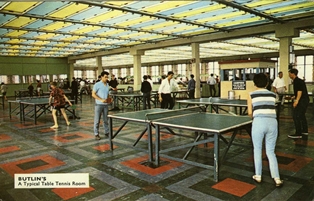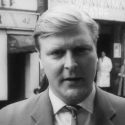Declaring that “everything in the world exists to end up on a postcard” is pretty courageous. But after watching the charming, gently funny Picture Postcard World of Nigel Walmsley you begin thinking that maybe, just maybe, everything was created to be depicted on a piece of card destined to be sent through the post. Holiday camps, motorways, hills, walls - all were created to become images printed on the postcards collected by deltiologists like Ronnie Barker and Michael Winner.
A deltiologist is a postcard collector. Michael Winner, who appeared here, is already well known to theartsdesk for his love of Donald McGill's postcards. Glbert and George though, have a slightly different take on postcards. All the postcard fan's needs are serviced by Reflections, The Picture Postcard Monthly. Fairs sell just postcards. Books like Tom Phillips’s The Postcard Century and Martin Parr’s Boring Postcards celebrate the world of “pictures on the front, writing on the back”. All much like any other collectable then, be it records, model cars, or teddy bears.
But postcards are different. As the fictitious and largely unseen Bristolian Nigel Walmsley travelled through the world of postcards, boning up before an equally bogus talk he’d been invited to give, their unique social and sociological aspects emerged.
On the morning of 19 July 1909 a train crashed at Croydon. Photos of the disaster were instant postcard fodder. The cards survive, and bear the postmark of that day. In pre-World War I Britain, with up to seven postal deliveries a day, a postcard sent in the morning could reach its destination the same day. Not quite text messaging or e-mail, but amazing for a world before the telephone became a household object.
We soon found out that postcards, of course, were more than news bulletins. They caught on quickly after emerging in Germany in the 1870s. Shops were dedicated to selling postcards. In 1902, 350 million were sent in Britain. In 1906, it was 700 million. The figures slacken off after World War I with the arrival of the phone, so the Edwardian era was repeatedly referred to as the postcard’s Golden Age. Stamps prices rose after 1918, the telephone arrived and the Golden Age was over. Another boom from the 1950s to 1970s came with post-WWII affluence, the increased taking of holidays and the need to let your family and relatives know that you wished they were here, the boarding house bed was lumpy and yah-boo, we’re here, you’re not. .
 They were also a promotional tool. Holiday camp chain Butlin’s recruited expert German photographers to take staged images, showing off their facilities in high-contrast colour. Hyper-real, these pictures share psychedelia’s altered reality. Less attractive perhaps, but equally appealing to photographer Martin Parr, are postcards of motorways – including an empty M1. He was taken there as a treat when he was a kid.
They were also a promotional tool. Holiday camp chain Butlin’s recruited expert German photographers to take staged images, showing off their facilities in high-contrast colour. Hyper-real, these pictures share psychedelia’s altered reality. Less attractive perhaps, but equally appealing to photographer Martin Parr, are postcards of motorways – including an empty M1. He was taken there as a treat when he was a kid.
Postcards were occasionally notorious too. The king of the sauce and smut, Donald McGill, was the first full-time postcard artist and now has a dedicated museum on the Isle of White. Back in 1954, however, he was recognised in a different way and prosecuted for his double entendres straying too close to single meanings. Sales didn’t suffer. The Isle of Man and Blackpool had Postcard Censoring Committees which vetted the next season’s offerings. Cameras peaked in on their meetings. It wasn’t said how they cooled off after rigorous examination of one smutty card after another.
But the postcards themselves has personal stories as well. It was possible to visit a studio, have a portrait taken and purchase a dozen or more of yourself. As put here, this was the democratisation of the portrait. Postcards were seen by all after being mailed, so scribblers developed codes and wrote in allusion about entering tunnels, whatever that means. A tilted stamp was an emoticon, denoting affection
No wonder then that Ronnie Barker, Michael Winner and Andrew Sachs - all of whom cropped up: not many female deltiologists around – were attracted to the postcard’s manifold aspects. More ironic was the appearance of blogger Guy Atkins, representing the medium which ensures there’ll never be another Golden Age for the postcard.
The Picture Postcard World of Nigel Walmsley did more than bring the postcard into the living room. It invited you – made you - want to get out, find a second-hand shop, go to a fair and start rummaging around for these artefacts, with their mysterious messages and tantalising images of lost worlds.
- Watch The Picture Postcard World of Nigel Walmsley on BBC iPlayer















Add comment